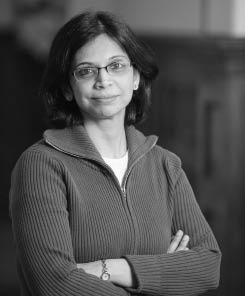New Faces
New faculty and staff share their perspectives and experience
SRIKALA NARAIAN
Assistant Professor of Education, Curriculum & TeachingWHAT FIELDS WILL YOU BE TEACHING?
Though my initial training and teaching experience situates me in the field of special education, I believe that my recent work and current interest more accurately reflect a preoccupation with inclusive education. I currently teach courses in the Elementary Inclusive Preservice program where I bring not only my background knowledge and experience of students with disabilities but also a commitment to increasing the capacity of general education classrooms to more effectively meet the needs of students with varying kinds and levels of learning needs. At the doctoral level, my teaching will focus on investigating the theoretical frameworks that can support inclusive practice.
WHAT ACADEMIC PATH LED YOU TO TC?
During the course of my work as a teacher for students labeled as blind, visually impaired and multiply impaired, I was introduced to the field of Disability Studies through engagement with activist organizations. I transferred this interest in the field of Disability Studies to my doctoral studies where I learned to refine my understanding of this perspective and then design my research in ways that would reflect a new and more expansive conceptualization of education for students with disabilities. Subsequently, my doctoral work earned me the Disability Studies in Education Junior Scholar Award in 2007. At TC, I have found scholars who actively support this approach, sharing the belief that an interest in the education of students with disabilities necessarily implies an interest in the education of all students.
WHAT ARE YOUR ACADEMIC PASSIONS?
My research and teaching is undoubtedly strongly informed by a Disability Studies perspective. I want and hope to be able to draw on this approach to understand the many different ways that a teaching-learning context constructs learners. I am particularly interested in exploring how research from such a perspective can benefit groups whose voices have traditionally been ignored, for example, families and students with significant disabilities. I am simultaneously interested in situating this concern with reforming practice for students with disabilities within theories of learning that have traditionally been under-utilized in approaches to their education.
LAURA SMITH
Assistant Professor of Psychology and Education, Counseling & Clinical Psychology
WHAT FIELDS WILL YOU BE TEACHING?
I’m teaching a variety of applied and experiential courses within the counseling psychology curriculum, including Group Counseling, Consultation to Community Agencies, Racial-Cultural Counseling Lab, and the Basic Doctoral Counseling Practicum. Next year, I’ll begin teaching the School Counseling course as well.
WHAT ACADEMIC PATH LED YOU TO TC?
The path that led me here had as much to do with my experiences as a practitioner as it did with my academic background. I was trained as a counseling psychologist and spent the first part of my career in college counseling centers, first as an internship training director at Pace University and then as the Director of Counseling Services at Barnard College. Throughout those years, however, my interest in working at the community level was growing, so when I had the chance to become the director of psychological services at the West Farms Career Center in the Bronx, I jumped at it. The Center has by now been reorganized, but at that time it was a multifaceted community-based organization offering a wide array of services to Bronx residents. There I had the opportunity to wear a number of hats as a psychologist, including working as the school counselor for an alternative high school sponsored by the Center as well as for the Department of Education’s suspension center for the Bronx. In the process, I came to realize how inadequately my conventional psychological training had prepared me for work in a poor urban community and became interested in studying the field’s general neglect of issues of poverty, social class and classism.
WHAT ARE YOUR ACADEMIC PASSIONS?
The questions and issues that interest me passionately are related to psychology’s neglect of social class and related issues, which merely parallels a widespread unawareness of class in society more generally—it seems that it takes a catastrophe like Hurricane Katrina to make us aware of how poor people live in this country, and even then, our awareness seems to last only as long the headlines. What are the attitudes, beliefs, assumptions and other psychological gymnastics that allow us to avert our gaze from the poor, who are all around us? I include poor working people here, since many of the people upon whose labor we depend every day cannot earn enough money to keep their families out of poverty. How can psychologists contribute their skills toward the elucidation of these issues, and how can we refine our own theory, research and practice accordingly? I’m especially passionate about the use of participatory action research (PAR) in urban schools and communities to address these questions. PAR is essentially a stance via which we don’t conduct research on community members, we conduct it with them. I believe that such a stance promises increased relevance in research questions, methodologies and results, even as it gives youth and other community members a voice in the creation of knowledge about their circumstances, experiences and needs. Members of poor communities don’t usually have voice in that way—they are studied, treated, counseled and otherwise managed, but usually with little or no say about the underlying assumptions, policies or procedures that shape their lives.
Published Tuesday, May. 6, 2008

